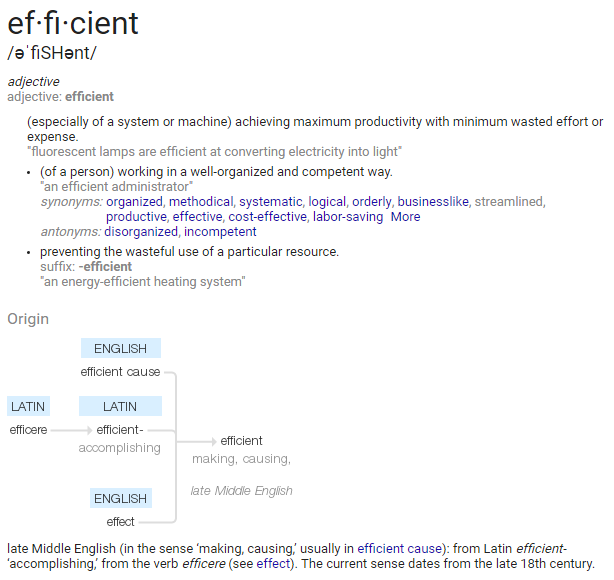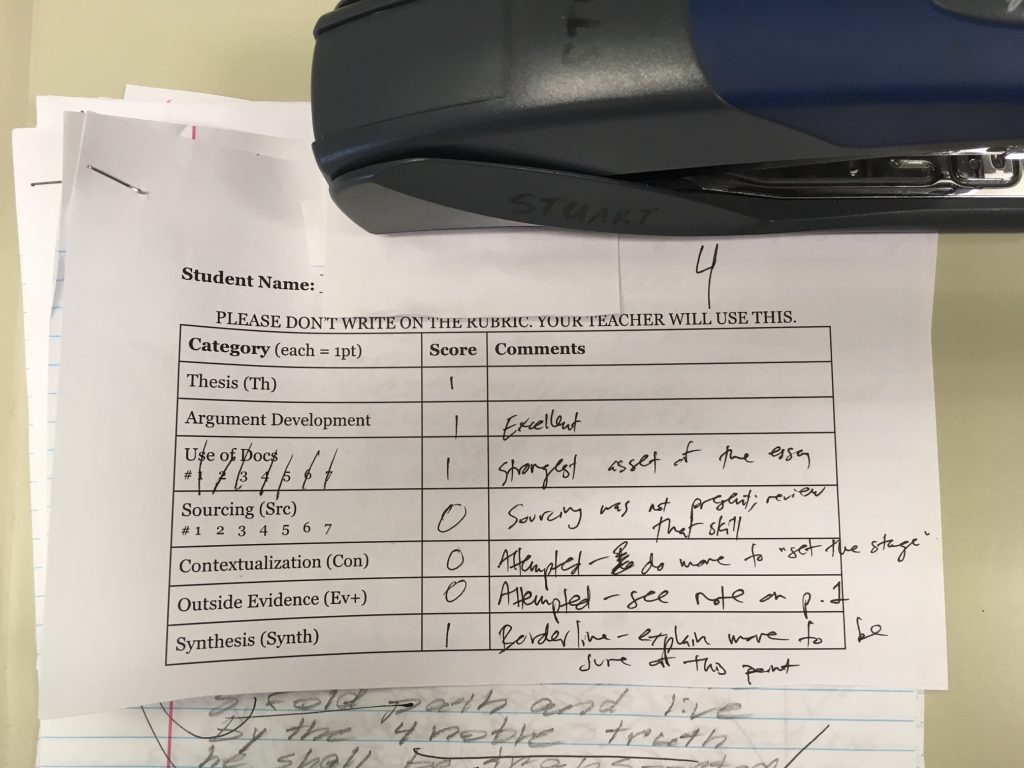Grading is not fun. I do not like grading. Therefore, my goal in grading is always this: do it as efficiently as possible. For the sake of really zeroing in here, let's be clear on the meaning of efficient — see Figure 1.

I like a lot of things about this “define efficient” Google result. When I grade, I want to:
- Achieve maximum productivity with minimum wasted effort or expense
- Prevent the wasting of particular resources (in this case, time)
- And, to go back to that Latin root, I want my grading to “accomplish” something
But in order for me to understand whether I'm efficient or not, I have to know what the point of grading this particular assignment is.
Consider two kinds of work I ask my students to do repeatedly during a world history course: Kelly Gallagher's Article of the Week (which includes a 250-word written response), and College Board's on-demand, Document-Based Question essays.
Here are my objectives with AoWs, in order of priority:
- Build knowledge about the world
- Increase reading and writing volume
- Sometimes: Practice argumentative reading and writing using the They Say, I Say two-paragraph template
From these fairly general purposes flows my fairly general (and fast) approach to grading AoWs, which I've written about here and which Gallagher and I discuss in this interview. When I give feedback on an AoW, it's at the whole-class or small-group level — hardly ever the individual level — because skill-building isn't the top priority.
On the other hand, here are my objectives with DBQs, in order of priority:
- Build specific writing skills pertinent to effective, evidence-based, historical arguments. Namely, seven specific skills:
- Crafting a historically defensible, on-topic thesis
- Using evidence from all of the provided documents to support the thesis
- Sourcing documents (analyzing how a document's content is affected by author's point of view, author's purpose, audience, or the historical context)
- Argument development (showing how documents corroborate, qualify, or contradict one another)
- Using outside evidence to support the thesis
- Contextualizing the overall argument
- Synthesizing the overall argument by extending it into a different time, place, theme, or discipline
From my intense focus here on the development of specific, discrete skills flows my very specific (and more time-intensive) grading of DBQ essays. In general, these take me four to six minutes to grade, as I'm completing a seven point rubric (see Figure 2) and writing comments as appropriate. (If you didn't see my stopwatch grading post, check that out here; I've found it useful to know how long a particular grading task takes.)

In short, the purpose of an assignment dictates our approach to grading it. This helps us grade more efficiently, which in turns makes us better and saner at our work.
Twins Happen says
I am really enjoying your grading tips. I’m constantly struggling with how to fit it all in, and I appreciate any help in this arena! Thanks for sharing!
davestuartjr says
Thank you!!! This is good feedback — it’s an area I’ve avoided writing about for a long time.
Mike White says
In my years of grading, the end has always been the bottom line. Reading this was an affirmation of end-minded grading. It reminds me to prepare a rubric BEFORE I assign the work to the students. For any time I forget to prepare one–or, more often than not, toss an impromptu writing task derived from an exquisite teaching moment–I still have to develop an end-result rubric to center my attention on what it is I wanted my students to accomplish.
Two new ideas I take away from this piece (AOW grading guidelines and the introduction to DBQs) are great gain for me. As a product of the Creative Writing class completed last semester, I’m still too focused on just seeing the argument moves They Say/I Say format. Now, I can prepare students to focus on the core goal of AOWs: knowledge building, as well as improve the Monday student-prep lesson.
I’m going to research DBQs; they sound exactly like the constructed response prompts from our EOCs.
As always, the circular relevance of your articles makes the timing of each one excellent for my whirlwind of lessons/plans/perspectives. On we barrel toward flourish-over-ignorance! Have a day!!
Twins Happen says
Thank you for including the link to your interview with Kelly Gallagher! I could listen to you two talk forever! You both have me thinking about student reading and writing, how to increase the volume of it throughout the school year, and how to effectively assess it (if it should, in fact, be assessed at all!) Thank you for sharing! Thank you for your work! I hope you are enjoying your Thanksgiving break!